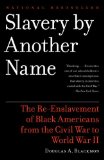Summary | Excerpt | Reviews | Readalikes | Genres & Themes | Author Bio
The Re-Enslavement of Black Americans from the Civil War to World War II

Critics' Opinion:
Readers' Opinion:
First Published:
Mar 2008, 480 pages
Paperback:
Jan 2009, 496 pages
Chapter I
The Wedding
Fruits of Freedom
Freedom wasn’t yet three years old when the wedding day came. Henry Cottinham and Mary Bishop had been chattel slaves until the momentous final days of the Civil War, as nameless in the eyes of the law as cows in the field. All their lives, they could no more have obtained a marriage license than purchased a horse, a wagon, or a train ticket to freedom in the North. Then a final furious sweep of Union soldiers—in a bewildering blur of liberation and terror unleashed from a distant war—ravaged the Cahaba River valley.
Henry was suddenly a man. Mary was a woman, a slave girl no more. Here they stood, bride and groom, before John Wesley Starr, the coarse old preacher who a blink of an eye before had spent his Sundays teaching white people that slavery was the manifestation of a human order ordained by God, and preaching to black people that theirs was a glorified place among the chickens and the pigs.
To most people along the Cahaba River, January 1868 hardly seemed an auspicious time to marry. It was raw, cold, and hungry. In every direction from the Cottingham Loop, the simple dirt road alongside which lived three generations of former slaves and their former owners, the land and its horizons were muted and bitter. The valley, the undulating hills of Bibb County, even the bridges and fords across the hundred-yard-wide Cahaba sweeping down from the last foothills of the Appalachians and into the flat fertile plains to the south, were still wrecked from the savage cavalry raids of Union Gen. James H. Wilson. Just two springs earlier, in April 1865, his horsemen had descended on Alabama in billowing swarms. The enfeebled southern army defending the state scattered before his advance. Even the great Confederate cavalry genius Nathan Bedford Forrest, his regiments eviscerated by four years of war, was swept aside with impunity. Wilson crushed the last functioning industrial complex of the Confederacy and left Alabama in a state of complete chaos. Not three years later, the valley remained a twisted ruin. Fallow fields. Burned barns. Machinery rusting at the bottoms of wells. Horses and mules dead or lost. The people, black and white, braced for a hard, anxious winter.
From the front porch of Elisha Cottingham’s house, two stories stacked of hand-hewn logs and chinked with red clay dug at the river’s edge, the old man looked out on his portion of that barren vista. The land had long ago lost nearly all resemblance to the massive exuberance of the frontier forest he stumbled upon fifty years earlier. Now, only the boundaries and contours remained of its carefully tended bounty of the last years before the war.
He had picked this place for the angle of the land. It unfolded from the house in one long sheet of soil, falling gradually away from his rough-planked front steps. For nearly five hundred yards, the slope descended smoothly toward the deep river, layered when Elisha first arrived with a foot of fertile humus. On the east and south, the great field was hemmed in by a gushing creek, boiling up over turtle-shell shapes of limestone protruding from the banks, growing deeper and wider, falling faster and more furiously—strong enough to spin a small grist mill—before it turned to the west and suddenly plunged into the Cahaba. He named the stream Cottingham Creek. An abounding sense of possibility exuded from the place Elisha had chosen, land on which he intuitively knew a resourceful man could make his own indelible mark.
Yet in the aftermath of the war Elisha Cottingham, like countless other southern whites in 1868, must have felt some dread sense of an atomized future. They knew that the perils of coming times constituted a far greater jeopardy than the war just lost. A society they had engineered from wilderness had been defeated and humiliated; the human livestock on which they had relied for generations now threatened to rule in their place. In the logical spectrum of possibilities for what might yet follow, Elisha had to consider the terrifying—and ultimately realized—possibility that all human effort invested at the confluence of Cottingham Creek and the Cahaba River would be erased. The alacrity that infused their achievement was lost. More than a century later, the last Cottingham would be gone. No trace of the big house, the slave cabins, or a waterwheel would survive. None of the fields hacked from the forest remained at plow. Only the creek and sun-bleached gravestones clustered atop the hill still bore the Cottingham name.
Excerpted from Slavery By Another Name by Douglas A. Blackmon Copyright © 2009 by Douglas A. Blackmon. Excerpted by permission of Anchor, a division of Random House, Inc. All rights reserved. No part of this excerpt may be reproduced or reprinted without permission in writing from the publisher.





The House on Biscayne Bay
by Chanel Cleeton
As death stalks a gothic mansion in Miami, the lives of two women intertwine as the past and present collide.

The Flower Sisters
by Michelle Collins Anderson
From the new Fannie Flagg of the Ozarks, a richly-woven story of family, forgiveness, and reinvention.

The Funeral Cryer by Wenyan Lu
Debut novelist Wenyan Lu brings us this witty yet profound story about one woman's midlife reawakening in contemporary rural China.
Your guide toexceptional books
BookBrowse seeks out and recommends the best in contemporary fiction and nonfiction—books that not only engage and entertain but also deepen our understanding of ourselves and the world around us.